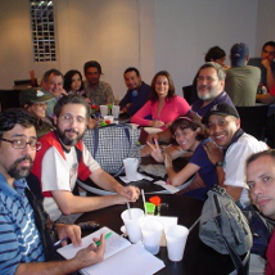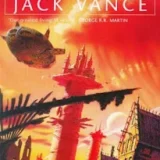
The mathematician split his time evenly among observation, calculation, and sleep. He never did conform to the can’s twenty-four-hour schedule. He had been accustomed to a thirty-hour day, and apparently saw no social or functional reason to change. Ten hours of observation. Ten hours of calculation. Ten hours of sleep. He had a small clock in his room with no face, only a small bell on top. It sounded out a tinny, tiny ring exactly every ten hours, and the mathematician would shift his activity at the sound.
He had said one thing, upon arrival, “I work for the betterment of all. Not as a master, but as a shepherd. I will need a room with these dimensions exactly.” And he handed over to the can’s mayor a small slip of paper with carefully penned figures on it. A good-natured woman, the mayor laughed, and then looked over the can’s blueprints to see if such a room even existed. They had no builders or architects or machinists who could rearrange the walls of the can, but she did find a supply closet which matched the figures on the slip very closely. “It will suffice” he said simply and took up residence among the boxes of cleaning solvent and generator fuel. The mayor, in her continued kindness, ordered that the supplies be replaced with furniture for the mathematician. He did not thank her.
He had been given an assignment as a custodian on second shift, but he either ignored it, or didn’t understand it. He never showed up for duty; instead, he seemingly walked the halls aimlessly, sometimes stopping to observe people silently, but mostly just walking the halls for hours and hours, and though the mayor asked for patience with all the newly-arrived refugees, the others on his work detail became angry that they were made to do his work, and so eventually, the mayor visited him in his closet. That was when he handed over the first calculation.
It was a sheet filled with his carefully drawn figures. It detailed the current water filtration system by the numbers. Intake, output, replacement schedule, usage deferment, rations, everything regarding the water system was laid out with a level of precision that seemed uncanny, but the take-away was that the can’s residents could each have a daily ration which was 5ml higher than it had been before the refugees had arrived, and all it would require was a slight change to the filter replacement schedule, which would also save them one filter cartridge every three years. The mayor implemented his changes, but continued to insist that he show up for his assigned work detail. He never did, and eventually she, and everyone else, gave up trying, though they did not all give up their resentment.
It came out that the people who arrived with him, in a group of refugees from a can which had been breached by raiders, barely remembered that he had been with them. A few even insisted that he had not been in their old home, that he had somehow joined their group after their harrowing escape. This was how the suspicions began.
He never spoke to anyone during his observations, never asked questions about what they were doing or why, never requested measurements from them, and never seemed to take any himself. He simply walked the halls, watching, often with a simple ration bar in hand. He never once used his rations at the cantina to get a plate of fresh food.
After his observations, he would sit in his small room, with the abacus that seemed to be his only personal possession, and a notepad, clicking the beads back and forth, and making notes on the page. Every seven or eight of his days, he would have some recommendation for the mayor in the form of detailed calculations.
It started with the water filtrations system, but he also improved the food storage, the fuel usage, the bathing schedule, the opening times of the entertainment venues… System after system got slightly more efficient with each calculation, and after more observation, he would revisit the same system again, making it just one shade more efficient each time.
It was a year in, when one of his pages of calculations revealed a thief. A citizen had been stealing from the food supply for years, but had never been caught until the mathematician’s calculations told a clear story. The thief was tried and exiled, but she had been a friend to many in the can, and a group of angry citizens led by her husband demanded that the mathematician also be sent out to die in the wastelands.
By that time, though, it was difficult to argue that he was not a contributing member of the small society. Everyone had more rations, more free time, fewer health problems. One marriage had even been saved, all thanks to the quiet mathematician who neither accepted nor gave thanks for anything, who kept apart from the others so absolutely that he was nearly invisible unless his math made him obvious.
Eventually, he became part of the infrastructure of the can. Years passed, and the people continued to silently conform to his visions of efficiency. When the old Mayor died, and her son took over in her place, he found that there was little for him to do. The can ran on the mathematician’s thirty-hour day. Every calendar, every schedule of every citizen was silently controlled by the neat figures on his pages. Every ten hours, exactly, a tinny chime sounded out across the whole can.
He grew old in that tiny room, never making a friend, never finding love, seemingly content only to watch and run the numbers, the click click click of his abacus sounding out for hours and hours every day.
Until one day, it stopped. They searched the can, but found no sign of him or his abacus anywhere. Clearly, he had gone outside into the wastelands. Originally, there had been some suspicion that someone had forced him out the vault-like door, perhaps someone who, after all these years, still suspected that he might somehow be working for the raiders who had violated the other can. Wary eyes were cast at the husband of the thief who he had caused to be exiled years before, but soon, they understood the truth.
In his little closet, they found one last meaningful calculation. This final page of figures showed a diminishing return in the results of his own work. The retention of resources that he could secure for the society was no longer outweighed by his own consumption. In one last selfless act in the name of efficiency, he had opened the door, and let himself out.
Though they knew his likely fate out there alone, many citizens took pleasure imagining the look on the face of the mayor of the next can he wandered into. “I work for the betterment of all,” He would say to them, “Not as a master, but as a shepherd. I will need a room with these dimensions exactly.”
END









